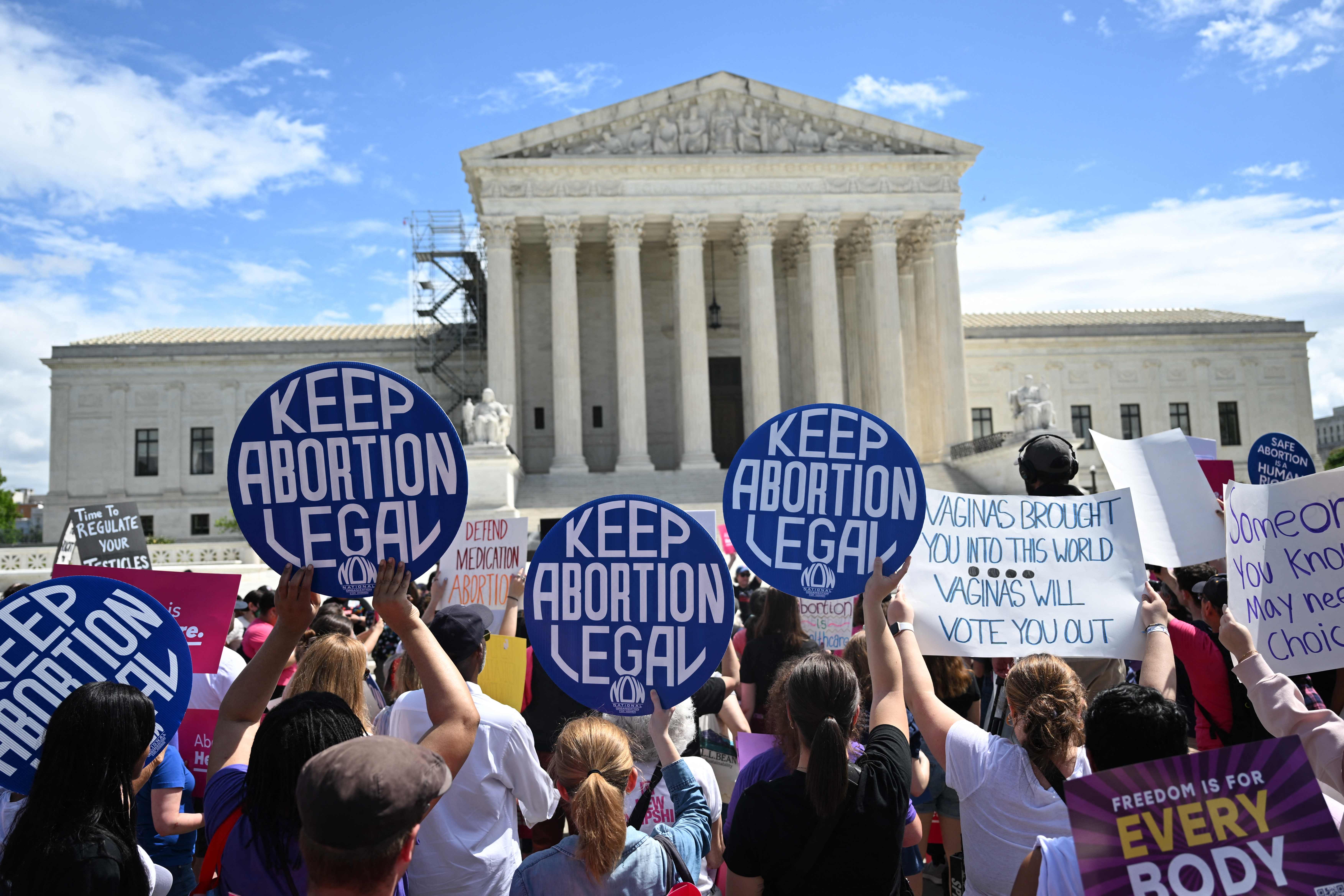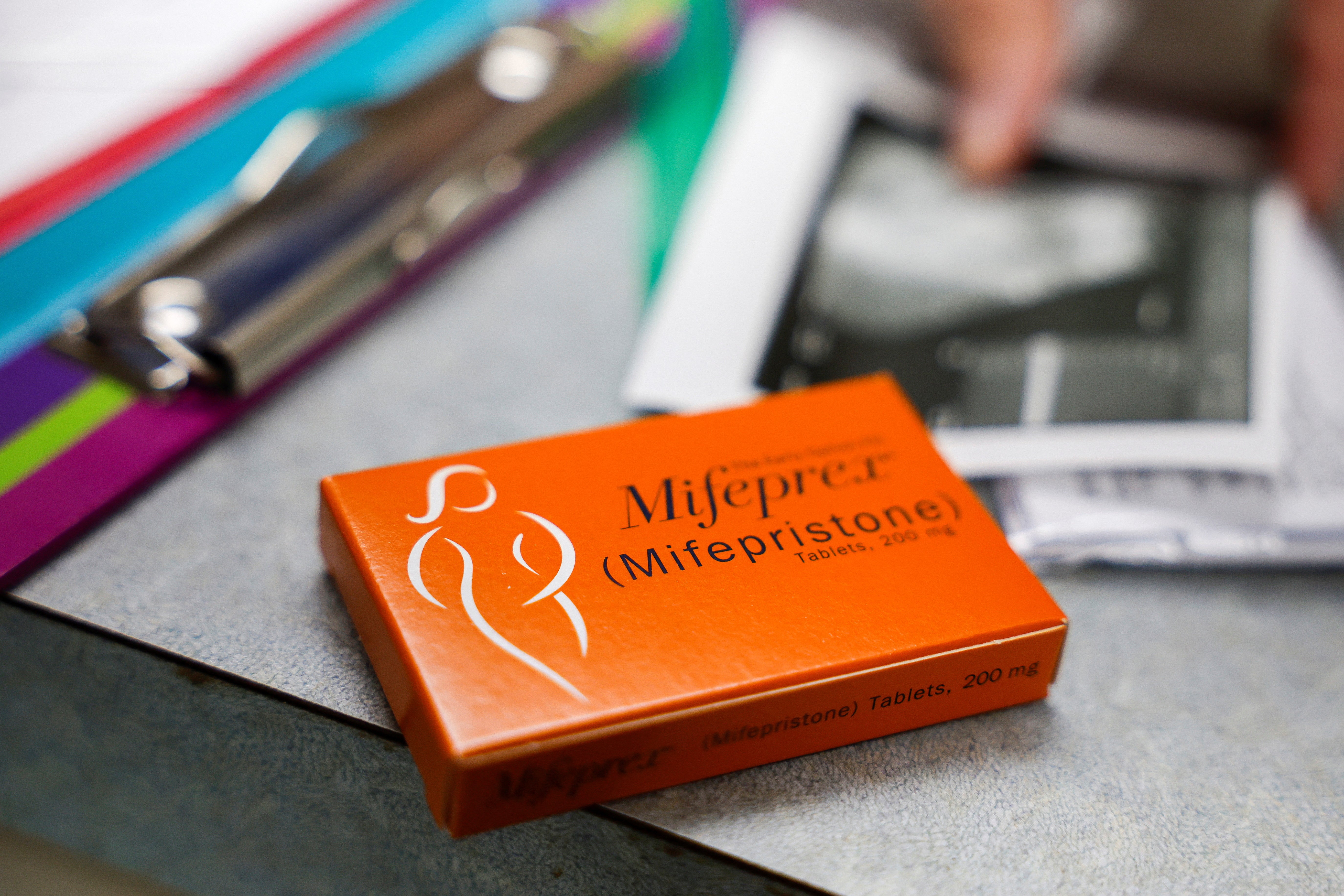Mifepristone ruling – latest: Supreme Court decision keeps medical abortion pill approval in place
The nation’s highest court will weigh in on a challenge to the FDA’s approval of the drug

Your support helps us to tell the story
From reproductive rights to climate change to Big Tech, The Independent is on the ground when the story is developing. Whether it's investigating the financials of Elon Musk's pro-Trump PAC or producing our latest documentary, 'The A Word', which shines a light on the American women fighting for reproductive rights, we know how important it is to parse out the facts from the messaging.
At such a critical moment in US history, we need reporters on the ground. Your donation allows us to keep sending journalists to speak to both sides of the story.
The Independent is trusted by Americans across the entire political spectrum. And unlike many other quality news outlets, we choose not to lock Americans out of our reporting and analysis with paywalls. We believe quality journalism should be available to everyone, paid for by those who can afford it.
Your support makes all the difference.The US Supreme Court has kept the government’s approval of a widely used abortion drug in place, while one of the biggest battles over abortion rights since the end of Roe v Wadecontinues in federal courts.
Justices on the nation’s highest court have paused a lower court ruling that challenge the government’s 23-year-old approval of mifepristone, part of a two-drug protocol for medication abortion, the most common form of abortion in the US.
Following an appeal from the Biden administration and drugmakers, the court paused a federal judge’s ruling that would strip the US Food and Drug Administration’s approval of mifepristone, which was first approved by the government agency in 2000.
A ruling to strike down the FDA’s approval of the drug would have drastically impacted access to abortion and miscarriage care for millions of Americans across the country, including in states where it is legally protected.
Matthew Kacsmaryk, the Trump-appointed judge who wants to ban mifepristone
Earlier this month, a Trump-appointed federal judge in Texas sided with an anti-abortion activist group in a lawsuit challenging the FDA’s approval of the commonly used abortion drug.
The Biden administration appealed, bringing the case to an appeals court in Louisiana and ultimately before the US Supreme Court, which has paused his ruling while the case continues to play out.
Meet the Texas judge and former anti-abortion activist attorney who set the case in motion.

Who is Trump-appointed judge Matthew Kacsmaryk trying to ban abortion drug?
The controversial federal judge in Texas has presided over several cases with far-reaching national implications
Texas judge behind abortion drug ruling didn’t disclose radio interviews where he said being gay was ‘a lifestyle’
The federal judge who suspended the US Food and Drug Administration’s approval of the abortion pill mifepristone failed to disclose two interviews where he discussed contraception and gay rights, CNN reported.
Matthew Kacsmaryk, a judge on the US District Court for the Northern District of Texas, made the remarks in two interviews with the Chosen Generation, a show that bills itself as having a “biblical constitutional worldview.”
The revelation follows other reports that he also failed to disclose writing a article in a legal journal criticising abortion and transgender healthcare – while he was being considered for the federal judiciary.

Texas abortion judge didn’t disclose interviews calling being gay ‘a lifestyle’
The judge who blocked the FDA’s authorisation of mifepristone says he did not recall the interivew
Joe Biden issues statement after Supreme Court decision
President Joe Biden said the Supreme Court’s decision blocks a ruling that “would have undermined FDA’s medical judgment and put women’s health at risk.”
“As a result of the Supreme Court’s stay, mifepristone remains available and approved for safe and effective use while we continue this fight in the courts,” he added.
“I continue to stand by FDA’s evidence-based approval of mifepristone, and my administration will continue to defend FDA’s independent, expert authority to review, approve, and regulate a wide range of prescription drugs,” the president continued.
“The stakes could not be higher for women across America,” he said. “I will continue to fight politically-driven attacks on women’s health. But let’s be clear – the American people must continue to use their vote as their voice, and elect a Congress who will pass a law restoring the protections of Roe v Wade.”
Major US abortion rights groups welcome Supreme Court decision but warn ‘we’re not out of the woods yet’
The Supreme Court’s decision to maintain mifepristone is “a huge relief, but we’re not out of the woods yet,” said Nancy Northup, president and CEO of the Center for Reproductive Rights.
“The lower court ruling out of Texas has zero basis in fact or law – and yet it has sowed chaos, confusion and panic for patients and providers across the country, including those in states with strong protections for abortion rights,” she added. “That crisis was not resolved today.”
Jennifer Dalven, director of the ACLU Reproductive Freedom Project, also welcomed the Supreme Court’s decision, adding that “it is frightening to think that Americans came within hours of losing access to a medication that is used in most abortions in this country and has been used for decades by millions of people to safely end a pregnancy or treat a miscarriage.”
“Patients shouldn’t have to monitor Twitter to see whether they can get the care they need,” she added.
What is mifepristone?
A medication abortion procedure typically consists of a two-drug protocol of mifepristone and misoprostol. Mifepristone is used in more than half of all abortions in the US.
The drug was first approved for use by the US Food and Drug Administration in most cases up to 10 weeks of pregnancy in 2000. A vast majority of abortions occur within the first nine weeks of pregnancy. From 2019 through 2020, nearly 93 per cent of all abortions were performed before the 13th week, according to the US Centers for Disease Control and Prevention.
Mifepristone is also used to treat miscarriages. Roughly 10 per cent of clinically recognized pregnancies end in miscarriages, according to the American College of Obstetricians and Gynecologists.

The widely used drug in the abortion rights battle at the Supreme Court
what is mifepristone used for?
How the Supreme Court ruled, and what happens next in the high-profile case over the future of a widely used abortion drug
The US Supreme Court has preserved access to a widely used abortion drug while legal challenges against mifepristone’s government approval continue, marking the court’s first major decision on abortion rights in the year after a constitutional right to abortion care was revoked.
The decision from the nation’s high court on 21 April will maintain the US Food and Drug Administration’s approval of the drug, which is used in more than half of all abortions in the US, after a federal judge in Texas struck it down in a ruling that would have profound and potentially dangerous consequences for millions of Americans if allowed to go into effect.
The case now returns to the Fifth Circuit Court of Appeals in Louisiana, where both parties will have a chance to file briefs. The case will be argued before a three-judge panel on 17 May.

Supreme Court preserves abortion drug approval as legal case plays out
The court’s decision averts the loss of a widely used abortion drug, preserving access to abortion care for millions of Americans
What is the Comstock Act and why is it involved in this case?
A puritanical Civil War-era federal law that sought to ban the mailing of “lewd” or “obscene” material is referenced in an anti-abortion activist group’s legal challenge to mifepristone that came before the Supreme Court.
The law has been repeatedly undermined by other laws and in the courts, but it remains on the books, exploited by anti-abortion activists who are now using the law to argue why it is technically illegal to mail abortion drugs.
The US Department of Justice disputes that argument. Pharmacists or other providers who mail mifepristone have no idea whether it will be used illegally, and the medicine is also used in miscarriage care. Mifepristone was approved for use 23 years ago, and can be taken up to 10 weeks of pregancy, when the vast majority of abortions are performed. The drug is used similarly in dozens of countries.
But US District Judge Matthew Kacsmaryk argued that the Comstock Act forbids mailing abortion drugs. A three-judge panel at a federal appeals court also appeared to agree.
Mary Ziegler, a law professor at the University of California, Davis and an expert on reproductive health law, said anti-abortion activists have intentionally relied on the law as part of a broader strategy to criminalise abortion care,
“Because if you can prosecute anyone for putting anything in the mail related to abortion, there is no abortion in the United States that takes place without something put in the mail,” she told NPR. “There are no abortion providers making DIY drugs and medical devices.”




Join our commenting forum
Join thought-provoking conversations, follow other Independent readers and see their replies
Comments